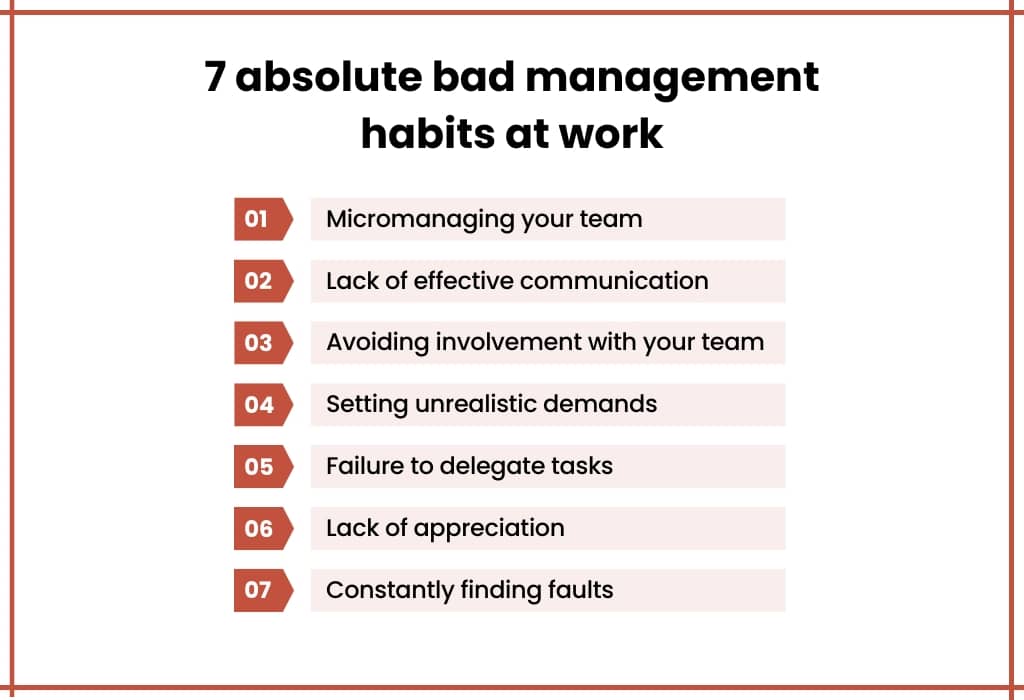Introduction
Bad management habits can kill productivity. They can disturb the work process, damage team dynamics, and lead to employee disengagement.
A recent poll by Gallup found that 77% of employees are not engaged at their workplace, often due to poor management practices.
And the reason for this is either poor management or bad managers. Teams with disengaged members are less productive and tend to be less loyal. As team members have no feelings for their co-workers, the employee turnover rate increases and results in poor work quality.
If you also feel like you are a bad manager, you should do something about it. But where to start? The first step you need to take is to recognize your poor management habits. And as expected, bad managers have a lot in common.
Below are the seven common bad management habits at work and how you can break them.
7 Absolute bad management habits at work
It often involves scrutinizing every detail of tasks, requiring frequent updates, and generally not trusting team members to work independently.

1. Micromanaging your team
If you are excessively monitoring or controlling your team members’ work, you are micromanaging them.
Micromanaging involves scrutinizing every detail of the tasks, seeking frequent updates, and not trusting team members to work independently. Now consider the scenario where someone is always looking over your shoulder and asking for frequent updates on your work progress. Or breathing down your neck to make sure that you are working “hard enough”.
How does it make you feel? Overbearing and irritating, right?
The reason behind micromanaging is always a fear of failure. You may not trust your team members enough to do their job right. So, you feel like you need to check on them constantly. And make sure they are doing their work correctly.
As a result, your team members feel insecure around you. They don’t want to be creative, innovative, or take any initiative. They don’t take risks or try new things because of the fear of being criticized.
How to break this habit?
Apart from being a micromanager, you need to find a way to monitor your team efficiently.
Is there any trust issue or fear of failure?
Once you are aware of the reasons for failure, then you become aware of how to fix that. If your team is lacking in trust, then provide your workforce liberty to work but with responsibility.
Secondly, if it is a failure dilemma, then try to build a stronger mindset. Take failure as an opportunity to learn something new.
Also, you should grant your team members the liberty to experiment with their creative ideas openly. With this approach, they can learn from their own mistakes and take accountability for their actions. At first, it will be difficult but with practice and discipline, your team will become creative and generate desired results.
2. Lack of effective communication
Communication is important for any relationship, and there is no exception for a manager and his team. But, there are very few managers who communicate effectively and on time with their team members.
You might be too busy, preoccupied, or wrapped up in your thoughts and concerns. And, you don’t have time to talk to your team members. As a result, you forget to pass down important information, and your team members are oblivious.
How to break this habit?
There are a few things a manager can do to improve their communication skills.
First, make yourself more available and approachable for the team. Whenever the team comes to you with questions or concerns, be patient with them. Actively listen to them, and try to give an honest and sincere answer.
A good manager is proactive with communication. So, if you have something to discuss with your team, don’t wait for them. Instead, send out a company-wide email or hold a meeting.
Plus, maintain open communication by encouraging your team members to provide feedback. Let them know that you are willing to listen to their output.
3. Avoiding involvement with your team
Many managers believe that the best way to manage employees is to simply let them do work on their own. They avoid getting too involved or being seen as a micro-manager. This leadership style is known as laissez-faire where a manager or leader takes a step back and allows team members to make decisions and solve problems independently.
But, this approach often backfires. Employees need guidance and direction to work well. Without it, they become lost and confused. As a result, frustration and resentment take place and eventually employees leave the company altogether.
How to break this habit?
If you want to give proper guidance to the team, the first step is – be more conscious and deliberate about it. When you assign tasks to the team, explain what you want them to do and why. Be specific and provide helpful resources and information to them.
Regularly check-in (hold daily or weekly meetings) with the team members to see how they are doing. Offer help if they need it. Turn mistakes into learning opportunities rather than moments for criticism.
4. Setting unrealistic demands
Managers often set unrealistic expectations, expecting constant availability and overtime, risk burnout, and decreased morale among team members.
All this results in making the work environment extremely stressful and anxious for employees, leading to their early burnout. Employees are also human beings, they are not robots. So you need to remember that they need time to rest, recharge, and renew.
How to break this habit?
If you want to make reasonable demands on your team, start by being more aware of your team members’ requirements and limits.
While assigning a task, consider how much time and energy it will take to complete it. Also, set adequate due dates. So that your team can do a good job without any undue stress or strain.
Practice empathy by understanding your team’s capabilities and workload. Your team members also need regular breaks and time off. They shouldn’t be expected to work all the time. Encourage your team to take vacation days, and respect their need for personal time and space.
5. Failure to delegate tasks
Failure to delegate tasks is one of the worst habits of a negative manager. They try to do everything themselves or micromanage employees to the point that they are reluctant to take any initiative.
As a consequence, employees feel unimportant and devalued. And the manager ends up feeling swamped and overworked.
How to break this habit?
If you struggle with delegation, strive to be more conscious of your own limits. You cannot accomplish everything on your own, and you should not attempt. Identify the tasks that only you can perform and focus your efforts on them.
Here, trusting your team members and giving them the responsibility and autonomy they need, plays an important role. When delegating, make sure your team has clear instructions and expectations. Focus on tasks that require your expertise while empowering others to take ownership.
6. Lack of appreciation
Failing to recognize and appreciate your team’s efforts can lead to demotivation and dissatisfaction. Regretfully, a lot of managers fail to appreciate their employees. They might be too distracted, concerned, or focused on their own thoughts and issues. Employees may thus start to feel invisible, devalued, and disrespected.
Express gratitude regularly through sincere compliments, positive feedback, or small gestures of appreciation.
Read more- Positive feedback examples: How to motivate your employees?
How to break this habit?
If you find it difficult to express gratitude, make an effort to be more thoughtful and intentional. Make sure you let a team member know you recognize and value their efforts when you witness them performing well. Positive reinforcement, even in small doses, has a powerful effect.
Be more explicit with your compliments. Try to highlight the team member’s accomplishments and your reasons for appreciation, rather than merely stating, “Good job.” By doing so, you can make the team members realize what you value in them and what you want from them.
7. Constantly finding faults
Negative, gloomy, and critical attitudes are common among bad managers. They perceive the glass as half empty and not half full.
They are quick to point out what is wrong but sluggish in appreciating what is correct. This kind of negativity spreads easily, quickly poisoning a whole team or company.
How to break this habit?
Attempting to be more optimistic is the first step if you’re a negative manager. This does not imply that you have to be artificial or cheery all the time; it simply means being more conscious of how you say and think about things. When anything awful happens, look for the silver lining. If something nice happens, make sure to acknowledge and appreciate it.
Additionally, it’s critical to provide additional encouragement and support. When one of your teammates confides in you with an issue, attempt to be supportive and focused on finding a solution rather than judgmental or unfavorable. Furthermore, be sure to express your gratitude to your teammates for their wonderful work. A small amount of positive reinforcement may go a long way.
Conclusion
Addressing bad management habits not only works toward improving team morale and productivity but also enhances overall organizational success.
By developing trust, improving communication, and showing appreciation, you can create a positive work environment where employees thrive.
For more such useful information, keep reading-



















No Comments